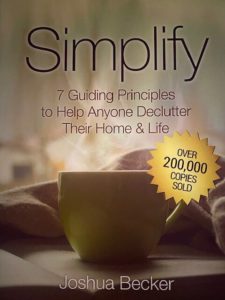These highlights are from the Kindle version of Simplify by Joshua Becker.

Clutter is a form of visual distraction, and everything in our vision pulls at our attention at least a little.
Our possessions consume our time. Whether we are cleaning them, organizing them, buying them, or selling them, the more things we own, the more time they rob from our lives.
When we made a commitment to buy fewer things, we opened up our lives to the opportunity of owning nicer things.
Minimalism is the intentional promotion of the things we most value and the removal of anything that distracts us from it.
I have a good friend who is trying to get out of debt. He was given some interesting advice by his debt counselor. His counselor didn’t tell him to pay off the highest percentage loans right away, instead he was told to pay off the smallest debts first. At first, I thought that was a bit odd until my friend told me the rationale: paying off the smallest debts first results in a victory – one less monthly payment. Even though it wasn’t the biggest burden, it is still one less burden – one victory. And victory breeds more victory.
Clutter is anything that is disorganized. The motto in our house is, “Everything has a home.” Clutter collects when things have strayed from their home and got mixed up with everything else. Anything that is disorganized or untidy is clutter.
A typical person wears 20% of their clothes 80% of the time. Try this experiment: turn around all of the hangers in your closet. After you wear an item, return it to the closet with its hanger facing the right direction. After 2-3 months, you will have an irrefutable, visual representation of the clothes you no longer wear. Donate them.
If you are nervous about the minimizing process, store items in a specially-marked box with the date clearly marked. After 3-4 months if you had no need for the item, perhaps you can function without it permanently.
“You say, ‘If I had a little more, I should be very satisfied.’ You make a mistake. If you are not content with what you have, you would not be satisfied if it were doubled.”
Charles Spurgeon
As a part of my full-time job, I frequently take adults and students to third-world environments. I have taken enough trips over the years that I can predict what the emotional response is going to be in the life of somebody who has never seen life outside of the established, consumer-driven, American culture where I live. They will inevitably have three emotions at some point during the trip: 1. They will be shocked that people with so little can be so joyful. 2. They will wish that they enjoyed life as much as the people they meet. 3. They will say that they are blessed to live in America and own so many possessions.
Sit down and determine your fixed monthly costs. These are the things that you currently have in your life that require some of your income every month – no questions asked. The actual monthly expense may vary (within reason) from month to month, but you know it is going to be there. For us, here is our list of monthly expenses: • mortgage • charity • groceries • auto fuel • auto insurance • savings/retirement • gas/electricity/utilities • water • college loan repayment • cable • phone/internet • cell phone • garbage • newspaper
“Fix your eyes not on what is seen, but on what is unseen. For what is seen is temporary, but what is unseen is eternal.”
Reject anything that is producing an addiction in you. Refuse to be a slave to anything: coffee, cigarettes, soda, television, chocolate, alcohol.
Learn to enjoy things without owning them. Ownership is nothing, access is everything. Visit a library, a park, or a museum.
We were never meant to live life accumulating stuff. We were meant to live simply enjoying the experiences of life, the people of life, and the journey of life – not the things of life.
In 1967, Charles Hummel wrote a book called Tyranny of the Urgent. A man ahead of his time, Hummel describes the tension between two contestants which battle for our time: the urgent and the important. He argues that the urgent things–such as the demands at the office, the demands of other people, and even our own “inner compulsions”– typically trump the things which are important, like regular dates with our spouse, personal solitude, exercise, or meditation.

